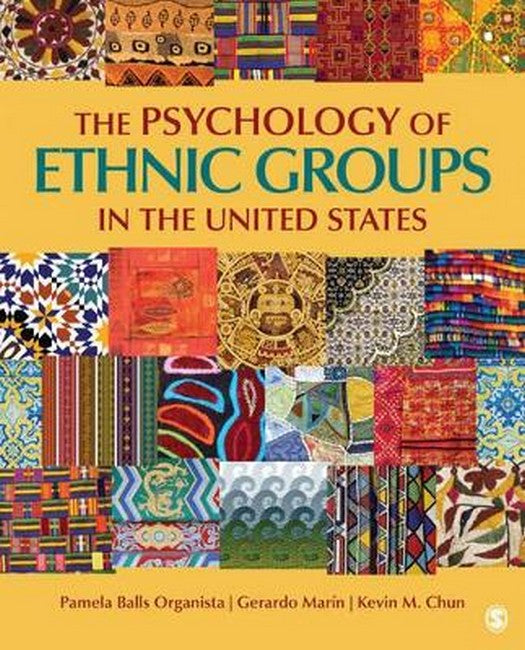Pamela Balls Organista, Ph.D., an African American psychologist, is Professor of Psychology at the University of San Francisco. Her research interests are in the areas of prevention interventions and ethnic minority health issues. Publications include the books, "Readings in Ethnic Psychology" (Routledge 1998) and "Acculturation" (APA 2003), which she co-edited with Kevin M. Chun and Gerardo Marin, and several articles on migrant laborers and AIDS and stress and coping in primary care patients. She is the founding faculty coordinator of the Ethnic Studies Program at the University of San Francisco. Gerardo Marin, PhD, is a Professor of Latin American Studies and Psychology, is Associate Provost at the University of San Francisco, and is an APA Fellow. He received his Ph.D. in social psychology from De Paul University. He has written more than 135 publications on topics that are relevant to Hispanics, including cultural norms and attitudes, risk behaviors, culturally appropriate methodology, and acculturation. He is the author of two widely used acculturation scales for Hispanics and was the editor of the recent Surgeon General's Report on Smoking regarding the four ethnic minority groups. In 1991, he coauthored the book Research With Hispanic Populations with Barbara VanOss Marin and is also the co-editor of Acculturation: Advances in Theory, Measurement, and Applied Research (2003) and Readings in Ethnic Psychology (1998). Kevin M. Chun, Ph.D., a Chinese American psychologist, is Associate Professor of Psychology and Asian American Studies at the University of San Francisco, Senior Investigator at the University of California at San Francisco, and Alumni Scholar at the National Research Center on Asian American Mental Health, University of California at Davis. His research focuses on processes of adaptation and their relation to health and psychosocial adjustment for Asian American immigrants and refugees. Publications include "Readings in Ethnic Psychology" (Routledge 1998) and "Acculturation" (APA 2003), which he co-edited with professors Pamela Balls Organista and Gerardo Marin. He is also a contributing author to several scholarly compendiums, including "Handbook of Asian American Psychology" and "Ethnocultural Approaches to Understanding Posttraumatic Stress Disorder."
Request Academic Copy
Please copy the ISBN for submitting review copy form
Description
1: ETHNIC DIVERSITY AND PSYCHOLOGY Outline Vignette: Learning About Ethnic Diversity in Psychology The United States as an Ethnically Diverse Society The Ethnic Diversity of the United States Why Study the Psychology of Ethnic Diversity? Ethnic Psychology as Different From Cross-Cultural Psychology The Growth of Ethnic Psychology Key Terms Learning by Doing Suggested Further Reading 2: BASIC THEORETICAL CONCEPTS Outline Vignette: "Mommy, What Color Are You?" Understanding Culture Understanding Ethnicity Understanding Race Social Orientations or Ways of Being Social Stratification Minority Status Power and Privilege Key Terms Learning by Doing Suggested Further Reading 3: METHODOLOGICAL ISSUES IN ETHNIC PSYCHOLOGY RESEARCH Outline Vignette: "That Is Not Me!" Culturally Appropriate Research Implementing Culturally Appropriate Research The Problem of Limited Participation in Research Ethical Considerations Key Terms Learning by Doing Suggested Further Reading 4: ACCULTURATION Outline Vignette: "Call Me 'Jessie,' Not 'Josefina!" Defining Acculturation Acculturation, Assimilation, and Segmented Assimilation Models of Acculturation Generational Differences and Acculturation Acculturative Stress Measuring Acculturation Levels of Acculturation Key Terms Learning by Doing Suggested Further Reading 5: INTERSECTING IDENTITIES: ETHNIC, RACIAL, GENDER, SEXUAL, AND CLASS DIMENSIONS Outline Vignette: Why Do We Have To Label Everyone?" What Is Identity? Understanding the Multiple Facets of the Self Dimensions of Identity in a Sociocultural Context How Do Identities Intersect? Heterogeneity and Hybridity in a Multicultural World Models of Identity Development and Formation Relationship of Identities to Psychosocial Adjustment Key Terms Learning by Doing Suggested Further Reading 6: FAMILY STRUCTURE, RELATIONS, AND SOCIALIZATION Outline Vignette: In My Family, We Never Openly Say 'I Love You'" An Ecological Perspective of Family Functioning How Do You Define a Family? Family Structures and Household Arrangements Family Functioning, Socialization, and Adjustment Key Terms Learning by Doing Suggested Further Reading 7: SOCIAL BEHAVIOR IN AN ETHNICALLY DIVERSE SOCIETY Outline Vignette: A True Story by One of the Authors (G.M.) Stereotypes, Prejudice, and Discrimination Racism The Effects of Prejudice, Discrimination, and Racism Reducing Prejudice, Discrimination, and Racism The Benefits of an Ethnically Diverse Society The Effects of Studying at a Diverse College Key Terms Learning by Doing Further Readings 8: PHYSICAL HEALTH Outline Vignette: "Son, I've Lost Something." Influential Models of Health Culture, Ethnicity, and Health Health Disparities Among Ethnic Groups Culturally Competent Health Care Key Terms Learning by Doing Suggested Further Reading 9: PSYCHOLOGICAL DISTRESS AND TREATMENT ISSUES Outline Vignette: "He's Alright. He's Just Funny That Way." Mental Health and Psychological Distress Prevalence of Major Psychological Disorders Among Ethnic Minorities Culture-Bound Syndromes--Their Manifestations Service Utilization Selected Factors Influencing Effective Delivery of Mental Health Services Practical and Ethical Guidelines for Culturally Sensitive Practice Key Terms Learning by Doing Suggested Further Reading 10: AN EPILOGUE ON THE FUTURE OF ETHNIC PSYCHOLOGY Outline Community-Based Participatory Research (CBPR) Positive Psychology and the Role of Resilience The Sociopolitical Context of Ethnic Psychology Within the United States Key Terms
"I am most enthusiastic about this book. I designed the course and was thrilled to see that I finally found a good PSYCHOLOGY book with these incredible authors who are so well-respected in their field." -- Alyson L. Burns-Glover "The authors have provided a solid resource to the growing database on multicultural psychology. There are two outstanding features of the text that are worth mentioning. First, at the outset of every chapter (except the final chapter), the authors provide a vignette that illustrates practical applications of chapter material. The second major contribution of this book is the "Learning by Doing" exercises . . . These activities-or "mini-studies" as the authors describe them-will assist the reader in learning the information experientially and affectively, in addition to processing the information on an intellectual level." -- Dr. Chammie Austin

